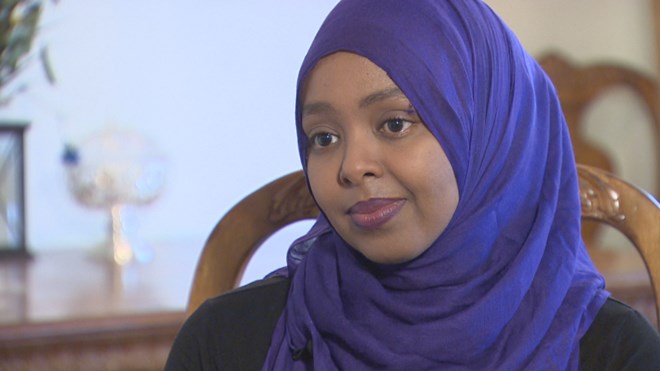
Tuesday October 17, 2017

The wait was only going to be a few minutes.
Abdi Warsame was sitting in a car with his five- and six-year-old boys, waiting for a friend to finish his banking in Mogadishu, Somalia, on Saturday.
Moments before, they'd bought a few pieces of watermelon from a woman, one of many street vendors making their living selling to the thousands who pass through the bustling intersection outside the Safari Hotel every day. A boy, no more than 16, came by, offering to hand wash the car.
That's when the blast hit, an explosion Warsame would later learn was the single deadliest Somalia had ever seen. He'd also learn he was less than 100 metres from the blast.
At that time though, he had to run. The sound was deafening and Warsame's only thought was to grab his two boys, one in each arm, and find cover.
"The entire ground just felt like it was divided into half and I felt the glass shatter and everyone was just running away from buildings collapsing," the Toronto father of five told CBC News from Mogadishu, where he remains with his sons, safe at a friend's home.
'Young men collapsing in front of me'
"I was running for my life and for the lives of my two little ones — my precious children," Warsame said. Gunshots were going off all around them as panic set in, no one knowing who to trust or if another explosion was imminent. All the while Warsame ran and kept on running until he got to a hospital.
The death toll from Saturday's truck bombing is still rising, now exceeding 300, officials say. As the numbers climb, despair and horror hang over Somalia, whose president, Mohamed Abdullahi Mohamed, has declared three days of mourning. The government blames the al-Qaeda-linked al-Shabaab extremist group, which has not commented.
There are an estimated 500 to 1,000 Canadians currently living in Mogadishu, Global Affairs Canada says. So far there are no reports of Canadians hurt or killed in the attack, but the department says it is ready to provide consular assistance to citizens as needed.
Fortunately, neither Warsame nor his children were seriously hurt. His youngest sustained just a cut. So it wasn't until he arrived at the hospital that the sheer horror of it all became clear.
"There were young men just collapsing in front of me. I could see one holding his tummy, I could see this humongous hole … I could literally see his ribcage," he said, recalling trying to shield his boys' eyes as the man fell to his knees and died in front of them.
He'd soon find out his friend at the bank was OK. But another friend was killed in the blast.
Attacks 'meant to instil fear'
Half a world away in Toronto, Samiya Abdi was frantically texting her friends as news of the explosion started flashing on her television and social media feeds. All but one, a friend who worked with the Ministry of Humanitarian Affairs, responded.
Abdi soon learned he was among the dead.
Abdi was born in the country's capital, Mogadishu, but her family moved to Canada when she was just a baby as tensions in Somalia were escalating.
She'd just been to her home country, for the very first time since the family left, to visit a few weeks ago and had been at the very spot where the attack took place before it was reduced to rubble and devastation.
Intersection 4, she said, was beautifully paved, bustling young people at any time of day or night, young men playing guitars singing old romantic songs and restaurants buzzing. A sign in bright lights with one of the government's official slogans, "Nabad iyo Nolol," meaning "Peace and Life" stood there when she'd visited.
That sign now serves as a symbol of what the attackers tried to destroy, she told CBC News.
"It is intentional for it to take away that hope and to make people think that Mogdadishu is not a safe city.… It was to instil fear into the hearts of citizens, regular citizens, young people and mothers," Abdi said.
Toll of attack may never be known
Hamilton nurse practitioner, Hodan Ali, has been working in primary care in Mogadishu for the past two years and told CBC Radio's As It Happens that nothing could have prepared her for the carnage she saw.